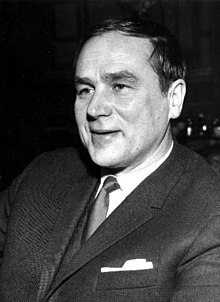Georg Ots
Georg Ots | |
|---|---|
 Georg Ots in 1962 | |
| Born | Georg Ots 21 March 1920 |
| Died | 5 September 1975 (aged 55) Tallinn, Estonia |
| Occupation(s) | Singer, actor |
| Years active | 1942–1975 |
| Spouse(s) | Margot Laane (1941–1941) Asta Saar (1944–1964) Ilona Noor (1964–1975) |
Georg Ots (21 March 1920 – 5 September 1975) was an Estonian baritone. He sang at the Estonian National Opera from 1951 to his death in 1975. Ots gained wider recognition with his roles at the Bolshoi Theatre, particularly with his lead role in Tchaikovsky's Eugene Onegin with Galina Vishnevskaya as Tatyana. He was also celebrated for his performance in Mister Iks, based on Imre Kálmán's operetta Die Zirkusprinzessin.
Biography
[edit]Before studying singing with Aleksander Rahnel in Yaroslavl where a cultural centre for evacuated Estonians had been established, Ots was a young Navy Officer who had escaped a sinking ship bombed by the Kriegsmarine in 1941. Ots was saved and taken to Kurgan region of Russia. Six months later he auditioned for a place at the conservatory in Tallinn. He became a member of the chorus at the Estonian National Opera in Tallinn. His solo opera debut was a small part in Eugene Onegin in 1944. He soon became one of the most revered singers in Estonia and Finland, and was equally admired all over Russia.
Ots often performed at the Bolshoi Theatre in Moscow. His repertoire included the roles of Eugene Onegin, Escamillo, Renato, Don Giovanni, Papageno, Rigoletto, Iago, Porgy, Figaro, and Kabalevsky's Colas Breugnon. Ots sang in Estonian, Finnish, French, German, Italian, and Russian. One of Ots's most famous roles with which he is often identified was the lead character in Anton Rubinstein's opera The Demon. The libretto of The Demon is based on Mikhail Lermontov's famous epic poem, once banned because of its plotline involving a misalliance between a dark angel and a Georgian princess. Ots's interpretation of the angel mesmerized audiences and received rapturous reviews.
Ots also played a leading role in Between Three Plagues, a film based on a historical novel by Jaan Kross which illuminates the life of Balthasar Russow.
Ots performed in various European countries. After his death in 1975 caused by a brain tumour, the Tallinn Music School was named after him (now Georg Otsa nimeline Tallinna Muusikakool). In 1997, Russian scientists named a newly discovered minor planet after him, 3738 Ots (1977 QA1). His first wife Margot Laane fled the Nazi-occupied Estonia in 1942 and settled in Canada. Ots then wed Asta Saar and they were married for 20 years. In 1964 Ots married Ilona Noor. Ots had a son Ülo (also a musician) and a daughter Ülle with his second wife Asta, and a daughter, Mariann, with his third wife Ilona.
Ots's biography, written by Kulle Raig, was first published in Finnish in 2002 ("Saarenmaan valssi: Georg Otsin elämänkerta") and in Estonian in 2003. The book was published in Latvian in 2009, and in Russian in 2015.
Legacy
[edit]- Georg Ots Tallinn School of Music, a music school in Tallinn.
- Recordings with the Estonian National Symphony Orchestra and Neeme Järvi: arias from operas and operettas
- The Georg Ots Street in Tallinn city centre.
- The asteroid "1977 QA1" was named 3738 Ots in his honour.
- Cargo / passenger ferry MS Georg Ots was named in his honour.
References
[edit]- Georg Ots 100
- "Suomen suosituin virolainen", Helsingin Sanomat, 21.03.2020
- “Georg Ots and opera in Estonia and Canada”, Eesti Elu, 03.04.2020
- Гео́рг Отс, эстонский певец эстрады, оперы и оперетты (лирический баритон)
- Georg Ots and the Saint Petersburg Philharmonic Orchestra
- Georg Ots Bolshoi-teatterin lavalla, Yle Areena, 10.11.2013
- "Georg Ots – legenda jo eläessään", Suomen Viro-yhdistysten liitto (SVYL), 18.03.2020
- "Georg Ots. Tavaline inimene", ETV, 2020
